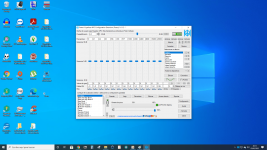Yes, I do it often. There are two ways.
- Make your output the "Disc Writer" This will write to a wave file instead of playing back from the sound card
- Convert Format. I often use this and just choose a different lossless codec or save it in a new folder.
I used a lot of time ago JRiver and didn't remember this use. Now I'm a very happy Daphile customer.
I downloaded EQ APO & like it, if you know a way to capture & save the files please let me know?Just move the sliders for each corresponding EQ frequency up or down: positive dB is up, negative dB is down from centre.
Yep, that's the one.
To go further than that, have a look at EQ APO, where each filter type itself can be selected (way more flexible). However, this is mostly for realtime EQ and listening. There may be a way to re-capture that too.
Saving the EQ curves is one thing.
Saving a processed file may be a bit more convoluted as this setup is normally used for realtime processing. On Linux, there may be a way with Jack, but I don't know the details here.
For offline processing, you're better off with Audacity and either the Filter Curve EQ Effect or the Graphic EQ effect (or installing a third party VST plugin). Load in the file, Select All, then process, then Export it as WAV again.
Saving a processed file may be a bit more convoluted as this setup is normally used for realtime processing. On Linux, there may be a way with Jack, but I don't know the details here.
For offline processing, you're better off with Audacity and either the Filter Curve EQ Effect or the Graphic EQ effect (or installing a third party VST plugin). Load in the file, Select All, then process, then Export it as WAV again.
I am thinking that there should be a possibility of having an audio interface play the audio, get it processed by EQ APO and capture the results into a file. Possible, but more time-consuming this way than with Audacity.
By the way, using this makes it easier to control EQ APO: https://sourceforge.net/projects/peace-equalizer-apo-extension/files/
Yeah If I know how to EQ the HD600, using APO & REW (I have done the room measurements time ago) can EQ to do DRC😊
It's not really made for that: it's for realtime DSP, i.e. while you're listening to your music.Filters done, I need to know how add files and how to EQ & save?
Doing the processing and save with this would require additional steps and configurations (e.g. with JACK).
I'd say keep this for listening to audio files which have not been pre-processed because if that works, you don't really need to pre-EQ them, right?
For the EQ + Save, then use Audacity if you really want to do that. Here, I'd say, there's no need because you can use EQ APO + Peace to apply the EQ realtime => you save time, as the preprocessing of audio is then unnecessary. Imagine having to re-process all your files with different headphones every time you get a new one - not practical.
Peace overrides the configuration & editing of EQ APO, so you make your EQ changes in Peace itself, save EQ curves in Peace, etc... You don't need to edit in EQ APO anymore. It's much easier IMO.For example I don't know how to import from EQ APO to Peace?
The problem is that I don't use Windows to play music files I use Daphile, other problem added is than I like & play DSD files so Daphile can't do EQ for headphones or DRC for room using converting all PCM files to DSD files.
- Home
- Amplifiers
- Headphone Systems
- EQ & save DSD files

